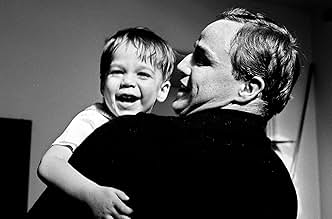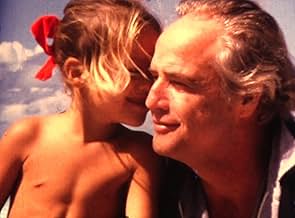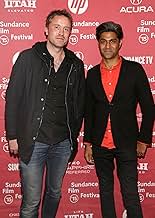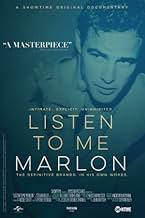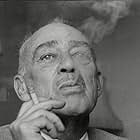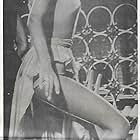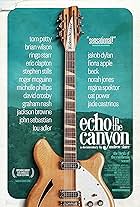CALIFICACIÓN DE IMDb
8.1/10
8.1 k
TU CALIFICACIÓN
Agrega una trama en tu idiomaA documentary that utilizes hundreds of hours of audio that Marlon Brando recorded over the course of his life to tell the screen legend's story.A documentary that utilizes hundreds of hours of audio that Marlon Brando recorded over the course of his life to tell the screen legend's story.A documentary that utilizes hundreds of hours of audio that Marlon Brando recorded over the course of his life to tell the screen legend's story.
- Dirección
- Guionistas
- Elenco
- Nominado a 1 premio Primetime Emmy
- 5 premios ganados y 21 nominaciones en total
Marlon Brando
- Self
- (material de archivo)
Stella Adler
- Self
- (material de archivo)
- (sin créditos)
Bernardo Bertolucci
- Self
- (material de archivo)
- (voz)
- (sin créditos)
Michael Borne
- Young Marlon Brando
- (sin créditos)
Marlon Brando Sr.
- Self
- (material de archivo)
- (sin créditos)
Christian Brando
- Self
- (material de archivo)
- (sin créditos)
Dick Cavett
- Self
- (material de archivo)
- (sin créditos)
Connie Chung
- Self
- (material de archivo)
- (sin créditos)
Montgomery Clift
- Self
- (material de archivo)
- (sin créditos)
Francis Ford Coppola
- Self
- (material de archivo)
- (sin créditos)
Bette Davis
- Self
- (material de archivo)
- (sin créditos)
Anna Kashfi
- Self
- (material de archivo)
- (sin créditos)
Elia Kazan
- Self
- (material de archivo)
- (sin créditos)
Robert F. Kennedy
- Self
- (material de archivo)
- (sin créditos)
Martin Luther King
- Self
- (material de archivo)
- (sin créditos)
Sacheen Littlefeather
- Self
- (material de archivo)
- (sin créditos)
Dorothy Malone
- Self
- (material de archivo)
- (sin créditos)
- Dirección
- Guionistas
- Todo el elenco y el equipo
- Producción, taquilla y más en IMDbPro
Opiniones destacadas
Not just a bio-documentary. Far beyond that... Listen to Me Marlon is the presentation of a legend... AS A MAN... By the own legend...
To younger people, such as myself, Marlon Brando was Don Vito Corleone (The Godfather), Colonel Kurtz (Apocalypse Now), Stanley (A Streetcar Named Desire), among many other great performances. But who was the man behind those iconic characters?
In Listen to Me Marlon, is delivered a compilation of many recordings by the actor to the actor himself. I don't think that he would be very pleased to have such tapes out there!
Troubled, charming, talented, politically engaged, passionate... The many faces of the man. Of the liar. When would I imagine that the man who played Don Vito Corleone and Colonel Kurtz, had problems with Francis Ford Coppola? And the tragedies of his personal life? How could I think about Brando as a ordinary guy?
He was no ordinary. And his tapes show it very clearly. Marlon was one unique human being. NO! Not one, two or even more... Marlon talks to himself. But himself is not Marlon... He was no ordinary...
As an art, the movie is beautiful. Not a typical boring documentary, with some footage, a couple interviews, and so and so. The director Stevan Riley was able to capture so many beautiful shots alongside with the music and the very voice of the actor. Flawless...
I know now many more than I ever imagined about Marlon Brando. And now it's like the experience of watching his work means to open so many other doors... Flawless bio-doc. It's a must see if you are interest in the motion picture industry as a whole.
To younger people, such as myself, Marlon Brando was Don Vito Corleone (The Godfather), Colonel Kurtz (Apocalypse Now), Stanley (A Streetcar Named Desire), among many other great performances. But who was the man behind those iconic characters?
In Listen to Me Marlon, is delivered a compilation of many recordings by the actor to the actor himself. I don't think that he would be very pleased to have such tapes out there!
Troubled, charming, talented, politically engaged, passionate... The many faces of the man. Of the liar. When would I imagine that the man who played Don Vito Corleone and Colonel Kurtz, had problems with Francis Ford Coppola? And the tragedies of his personal life? How could I think about Brando as a ordinary guy?
He was no ordinary. And his tapes show it very clearly. Marlon was one unique human being. NO! Not one, two or even more... Marlon talks to himself. But himself is not Marlon... He was no ordinary...
As an art, the movie is beautiful. Not a typical boring documentary, with some footage, a couple interviews, and so and so. The director Stevan Riley was able to capture so many beautiful shots alongside with the music and the very voice of the actor. Flawless...
I know now many more than I ever imagined about Marlon Brando. And now it's like the experience of watching his work means to open so many other doors... Flawless bio-doc. It's a must see if you are interest in the motion picture industry as a whole.
Listen to Me Marlon (2015)
**** (out of 4)
We are told that when Marlon Brando died in 2004 he left behind hundreds of hours worth of audio recordings that he made throughout his life. This rather unique documentary has Brando telling us his life story by using these audio recordings as well as some older interview footage.
Writer, director and editor Stevan Riley really did an amazing job here because it couldn't have been easy to take all of these audio recordings and put them into a "story" that it's clear and makes sense. The documentary covers Brando's early years with his parents and then gets into his movie career where it's clear the actor wasn't his fondest fan. Films like ON THE WATERFRONT, A STREETCAR NAMED DESIRE, THE GODFATHER and LAST TANGO IN Paris get some great talk but there's also some great audio footage dealing with Brando's "lost" period in the 60s when he was basically just doing films for the money.
Brando's life had all sorts of bad things happen including the various issues with is son and daughter. Those sad topics are covered here as well as other issues including his battle over the treatment of Indians. If you're a fan of Brando then you're certainly going to love this documentary because, well, the actor was a rather private person and didn't give too many interviews so it was great getting to hear his thoughts on life, himself and of course the movies.
**** (out of 4)
We are told that when Marlon Brando died in 2004 he left behind hundreds of hours worth of audio recordings that he made throughout his life. This rather unique documentary has Brando telling us his life story by using these audio recordings as well as some older interview footage.
Writer, director and editor Stevan Riley really did an amazing job here because it couldn't have been easy to take all of these audio recordings and put them into a "story" that it's clear and makes sense. The documentary covers Brando's early years with his parents and then gets into his movie career where it's clear the actor wasn't his fondest fan. Films like ON THE WATERFRONT, A STREETCAR NAMED DESIRE, THE GODFATHER and LAST TANGO IN Paris get some great talk but there's also some great audio footage dealing with Brando's "lost" period in the 60s when he was basically just doing films for the money.
Brando's life had all sorts of bad things happen including the various issues with is son and daughter. Those sad topics are covered here as well as other issues including his battle over the treatment of Indians. If you're a fan of Brando then you're certainly going to love this documentary because, well, the actor was a rather private person and didn't give too many interviews so it was great getting to hear his thoughts on life, himself and of course the movies.
A fascinating look into the life of Marlon Brando, made all the more compelling and unique through its use of Brando's own private audio and rare video recordings. If you're put off early on because it seems to be jumping around and/or it's hard to hear, stick with it. Aside from seeing many examples of Brando's absolutely brilliant acting, we see a complete view of his life, with all of its triumphs and difficulties.
Brando had problems with relationships, children, poor part selections, and was often a pain in the behind to his directors. That may also put people off, but I have to say, this documentary also shows just how laser sharp the man was. The same blistering honesty he brought to his acting roles, he also brought to life. He saw that acting was a means to an end – that time was the true currency of man – and after he had 'made it', he made sure to enjoy his life. He was a pillar of moral rectitude during the Civil Rights movement, standing up for African-Americans and later also for Native Americans. He saw through the phoniness and profiteering in the world, and sought to live his life simply in Tahiti and elsewhere. He had a difficult childhood and relationship with his father, and yet reached a point of forgiveness, understanding that his dad was a product of his own upbringing, and so on, and so on.
Despite the maelstrom of chaos and occasional controversy in his life, what emerges is the coherence of Brando's honesty and his moral code. He humiliated himself by taking parts that were ridiculous and which he later regretted, but if you put that into the context of his life and his priorities, you'll empathize with him, and will be far less prone to laughing at him. I was aware of all the elements of his story, but this documentary really brought it all together for me, and left me admiring the man even more. He was a true hero, a brilliant actor with a social conscience and an intellect that should is under-appreciated.
In terms of the documentary, there are some elements that are less effective. The scenes showing his crude digitized likeness. The audio when it's hard to understand, and which would have been helped with subtitles (turning on close caption helps, even if you're not hearing impaired). The less than even storytelling, though it's always the case that a biographer must choose what to leave in, and what to leave out. With all of that said, director Stevan Riley delivers, and there will be things in this documentary for everyone, regardless of how much you come in knowing about Brando. Strong film.
Brando had problems with relationships, children, poor part selections, and was often a pain in the behind to his directors. That may also put people off, but I have to say, this documentary also shows just how laser sharp the man was. The same blistering honesty he brought to his acting roles, he also brought to life. He saw that acting was a means to an end – that time was the true currency of man – and after he had 'made it', he made sure to enjoy his life. He was a pillar of moral rectitude during the Civil Rights movement, standing up for African-Americans and later also for Native Americans. He saw through the phoniness and profiteering in the world, and sought to live his life simply in Tahiti and elsewhere. He had a difficult childhood and relationship with his father, and yet reached a point of forgiveness, understanding that his dad was a product of his own upbringing, and so on, and so on.
Despite the maelstrom of chaos and occasional controversy in his life, what emerges is the coherence of Brando's honesty and his moral code. He humiliated himself by taking parts that were ridiculous and which he later regretted, but if you put that into the context of his life and his priorities, you'll empathize with him, and will be far less prone to laughing at him. I was aware of all the elements of his story, but this documentary really brought it all together for me, and left me admiring the man even more. He was a true hero, a brilliant actor with a social conscience and an intellect that should is under-appreciated.
In terms of the documentary, there are some elements that are less effective. The scenes showing his crude digitized likeness. The audio when it's hard to understand, and which would have been helped with subtitles (turning on close caption helps, even if you're not hearing impaired). The less than even storytelling, though it's always the case that a biographer must choose what to leave in, and what to leave out. With all of that said, director Stevan Riley delivers, and there will be things in this documentary for everyone, regardless of how much you come in knowing about Brando. Strong film.
If the usual celebrity documentary too often strays into the realm of "Let's see how many famous friends we can find to say nice things about the subject", Listen to Me Marlon, by contrast, is one of the loneliest feeling films about a performer whose works were experienced by so many. Billing itself as comprised from "hundreds of hours" of audio diaries recorded by the man almost universally billed as 'the world's greatest actor', the film is ultimately only half Brando in Brando's own words, interspersing his introspective mumblings with interview and news footage from the actor's life for a more neatly rounded documentary.
With this in mind, it's frustrating that, for a film about the actor celebrated for introducing method authenticity to the big screen, director/editor Stevan Riley indulges in so much cinematic trickery and documentary cliché (you can count the number of transitions not marked by solemn footage of wind chimes rustling on one hand ). Riley particularly gets a kick out of the trope of Brando's digitized head (but with nary a shout out to Brando's posthumously recycled performance in Superman Returns!), even having this CGI rendition 'speak' many of Brando's audio diaries, making significant eye contact with the audience at meaningful moments. Brando himself would likely scoff at the tackiness of this 'ghost Brando', and, while it does add a mesmerizing visual dimension to the 'talking heads' genre (arr arr arr ), it feels overused by the end, particularly while accompanied by the film's distractingly overbearing musical score. Mercifully, Riley stops short of having Ghost Brando sing "Luck Be a Lady Tonight". Shudder.
However, the real draw of the film, the 'Brando on Brando' audio recordings, do not disappoint. Brando has, of late, become almost less famous for his iconic performances as his on-set belligerence (guzzling jars of peanut butter in between takes, reading his lines off a baby's diaper in Superman, or refusing to wear pants on set); here, he is firmly restored as a human being. The Brando we get here is far more earnest and sensitive than the shirt-tearing brute cinema would make him out to be: articulate (no cotton-mouthed mumbling here!), introspective, surprisingly witty, and desperate to have a meaningful impact on the world. Amidst the pontifications on the value and necessity of acting and scorn for the falsities of celebrity – rousing in themselves – there are some movingly raw and emotional moments to be found, as Brando ruminates on the disastrous ramifications of his abusive upbringing and the ripple effects in the tragic lives of his own children, as well as important coverage of his often forgotten work with the civil rights movement from the 1950s-1970s. But, there's warmth to be found amongst the solemnity, as hearing Brando wax poetic about the paradise he found in Tahiti is genuinely moving, and it's hard, by the end, not to feel like he deserved the happiness.
As the film dreamily tumbles through the consecutive stages of Brando's career, it's fascinating to hear him candidly respond to audience reactions to him see-saw from Beatles- level hysteria to condescending indifference and back again through the years (spoiler alert: actors actually are affected by mass criticism!). Riley interweaves compellingly nostalgic clips from some of the earlier works in Brando's career (The Men, Brando's amusingly cringeworthy Mexican in Viva Zapata, Julius Caesar) and the seminal works (A Streetcar Named Desire, On the Waterfront, The Godfather), and hearing Brando's stiltedly pretentious justification for straying into "lighter fare" in Guys and Dolls is just about worth the price of admission alone. Riley particularly devotes focus to the controversy of Mutiny on the Bounty, which Brando attributes both his love of Tahiti and his loss of public favour to, while hearing Brando and Francis Ford Coppola trade barbs about whose fault the disastrous shoot of Apocalypse Now was (amusingly, both try to take credit for Kurtz being mostly kept in shadow – Brando claiming it was his aesthetic take on the character, while Coppola snaps it was to hide how obese Brando had become) is a masterclass of parallel editing in itself.
Listen to Me Marlon may be flimsier than one would hope for such a rich, intimate opportunity – content-wise, there's nothing that couldn't be found in his IMDb biography ¬– but Brando's life and career are wild enough that it still makes for a highly compelling watch. Where the film truly excels is not in facts, but feelings, as Brando himself conveys passion, dry wit, and a voluminous loneliness like none other. If nothing else, Listen to Me Marlon is worth it for granting Brando the true performance of his career: himself – not an overeating, eccentric, reclusive genius, but a human being, vulnerable, flawed, and perpetually yearning to make a difference in himself and the world. Few would dispute it: he was a contender, and he really was something.
-7/10
With this in mind, it's frustrating that, for a film about the actor celebrated for introducing method authenticity to the big screen, director/editor Stevan Riley indulges in so much cinematic trickery and documentary cliché (you can count the number of transitions not marked by solemn footage of wind chimes rustling on one hand ). Riley particularly gets a kick out of the trope of Brando's digitized head (but with nary a shout out to Brando's posthumously recycled performance in Superman Returns!), even having this CGI rendition 'speak' many of Brando's audio diaries, making significant eye contact with the audience at meaningful moments. Brando himself would likely scoff at the tackiness of this 'ghost Brando', and, while it does add a mesmerizing visual dimension to the 'talking heads' genre (arr arr arr ), it feels overused by the end, particularly while accompanied by the film's distractingly overbearing musical score. Mercifully, Riley stops short of having Ghost Brando sing "Luck Be a Lady Tonight". Shudder.
However, the real draw of the film, the 'Brando on Brando' audio recordings, do not disappoint. Brando has, of late, become almost less famous for his iconic performances as his on-set belligerence (guzzling jars of peanut butter in between takes, reading his lines off a baby's diaper in Superman, or refusing to wear pants on set); here, he is firmly restored as a human being. The Brando we get here is far more earnest and sensitive than the shirt-tearing brute cinema would make him out to be: articulate (no cotton-mouthed mumbling here!), introspective, surprisingly witty, and desperate to have a meaningful impact on the world. Amidst the pontifications on the value and necessity of acting and scorn for the falsities of celebrity – rousing in themselves – there are some movingly raw and emotional moments to be found, as Brando ruminates on the disastrous ramifications of his abusive upbringing and the ripple effects in the tragic lives of his own children, as well as important coverage of his often forgotten work with the civil rights movement from the 1950s-1970s. But, there's warmth to be found amongst the solemnity, as hearing Brando wax poetic about the paradise he found in Tahiti is genuinely moving, and it's hard, by the end, not to feel like he deserved the happiness.
As the film dreamily tumbles through the consecutive stages of Brando's career, it's fascinating to hear him candidly respond to audience reactions to him see-saw from Beatles- level hysteria to condescending indifference and back again through the years (spoiler alert: actors actually are affected by mass criticism!). Riley interweaves compellingly nostalgic clips from some of the earlier works in Brando's career (The Men, Brando's amusingly cringeworthy Mexican in Viva Zapata, Julius Caesar) and the seminal works (A Streetcar Named Desire, On the Waterfront, The Godfather), and hearing Brando's stiltedly pretentious justification for straying into "lighter fare" in Guys and Dolls is just about worth the price of admission alone. Riley particularly devotes focus to the controversy of Mutiny on the Bounty, which Brando attributes both his love of Tahiti and his loss of public favour to, while hearing Brando and Francis Ford Coppola trade barbs about whose fault the disastrous shoot of Apocalypse Now was (amusingly, both try to take credit for Kurtz being mostly kept in shadow – Brando claiming it was his aesthetic take on the character, while Coppola snaps it was to hide how obese Brando had become) is a masterclass of parallel editing in itself.
Listen to Me Marlon may be flimsier than one would hope for such a rich, intimate opportunity – content-wise, there's nothing that couldn't be found in his IMDb biography ¬– but Brando's life and career are wild enough that it still makes for a highly compelling watch. Where the film truly excels is not in facts, but feelings, as Brando himself conveys passion, dry wit, and a voluminous loneliness like none other. If nothing else, Listen to Me Marlon is worth it for granting Brando the true performance of his career: himself – not an overeating, eccentric, reclusive genius, but a human being, vulnerable, flawed, and perpetually yearning to make a difference in himself and the world. Few would dispute it: he was a contender, and he really was something.
-7/10
I am not the first to suggest that Marlon Brando was more interesting than the characters he played, including Stanley Kowalski and Terry Malloy. The new documentary, Listen to Me Marlon, takes three directors to do the acting legend justice. They do it well by searching hundreds of Brando's recordings and interviews to piece together a fascinating, unbiased look at his life.
They even have digitized versions of his head that they fit his voice to in a novel and slightly creepy fashion. The suggestion that he has come back from the grave is not far-fetched as the voice is authentic and the verbals those of a consummate actor who morphs into different voices given the circumstance.
Beyond Brando's observations about his roles such as in Lady from Shanghai, which he is ashamed of, are painful recounting about his daughter and son. His son murders her husband, serves 10 years while she subsequently commits suicide after several attempts. Brando's public reactions are sincerely remorseful that he couldn't have done more, especially for his troubled son.
But then, who's to know if the great actor is not acting? Such is the magic of his art that I would even suggest the artifice of his public persona. One thing is for certain, the great method acting teacher, Stella Adler, foresaw a world-class actor in her young student.
The glory and gloom of this famous man are all there. The clips from his performances are as fresh and exciting as ever. Those from his later successes such as Last Tango, Godfather, and Apocalypse Now are testimony to his inherent genius that as a fat man (think Orson Welles) he still leads the field (a comfort, no doubt, to such current geniuses as Daniel Day-Lewis).
Listen to Me Marlon is a seamless song to arguably the greatest actor who ever lived. He paid dearly for his successes and profligacies in equal measure.
Regardless of its occasionally tawdry subjects, this doc is for anyone interested in one of the few titans of the stage and screen.
They even have digitized versions of his head that they fit his voice to in a novel and slightly creepy fashion. The suggestion that he has come back from the grave is not far-fetched as the voice is authentic and the verbals those of a consummate actor who morphs into different voices given the circumstance.
Beyond Brando's observations about his roles such as in Lady from Shanghai, which he is ashamed of, are painful recounting about his daughter and son. His son murders her husband, serves 10 years while she subsequently commits suicide after several attempts. Brando's public reactions are sincerely remorseful that he couldn't have done more, especially for his troubled son.
But then, who's to know if the great actor is not acting? Such is the magic of his art that I would even suggest the artifice of his public persona. One thing is for certain, the great method acting teacher, Stella Adler, foresaw a world-class actor in her young student.
The glory and gloom of this famous man are all there. The clips from his performances are as fresh and exciting as ever. Those from his later successes such as Last Tango, Godfather, and Apocalypse Now are testimony to his inherent genius that as a fat man (think Orson Welles) he still leads the field (a comfort, no doubt, to such current geniuses as Daniel Day-Lewis).
Listen to Me Marlon is a seamless song to arguably the greatest actor who ever lived. He paid dearly for his successes and profligacies in equal measure.
Regardless of its occasionally tawdry subjects, this doc is for anyone interested in one of the few titans of the stage and screen.
¿Sabías que…?
- TriviaA documentary made entirely out of archive footage and Marlon Brando's own words from recordings, confessionals, and self hypnosis.
- Citas
Marlon Brando, Himself: Everything that you do - make it real as you can. Make it alive. Make it tangible. Find the truth of that moment.
- ConexionesFeatures Luces de la ciudad (1931)
- Bandas sonorasInfra 1
Written by Max Richter
Performed by Max Richter, Louisa Fuller, Natalia Bonner, Nick Barr (as Nick Carr), Ian Burdge and Chris Worsey
Selecciones populares
Inicia sesión para calificar y agrega a la lista de videos para obtener recomendaciones personalizadas
- How long is Listen to Me Marlon?Con tecnología de Alexa
Detalles
Taquilla
- Total en EE. UU. y Canadá
- USD 425,831
- Fin de semana de estreno en EE. UU. y Canadá
- USD 30,068
- 2 ago 2015
- Total a nivel mundial
- USD 516,337
- Tiempo de ejecución1 hora 43 minutos
- Color
- Relación de aspecto
- 1.85 : 1
Contribuir a esta página
Sugiere una edición o agrega el contenido que falta

Principales brechas de datos
By what name was Listen to Me Marlon (2015) officially released in Canada in English?
Responda



